
Kenyans, Chinese community celebrate International Chinese Language Day 2024 in musical style
Kenyans and many members of the Chinese community it embraces, came together on Thursday, April 18, to celebrate International Chinese Language Day in Nairobi.
The Confucius Institute at the University of Nairobi hosted a special event featuring a traditional Chinese music concert performed by the Nanjing University Traditional Instruments Orchestra.
Founded in 1996, the Nanjing University Traditional Instruments Orchestra is comprised of both undergraduate and graduate students from various departments at the university. The official UN-designated Chinese Language Day falls on April 20. However, the University of Nairobi’s Confucius Institute celebrated a few days earlier because the Nanjing University Traditional Instruments Orchestra will perform at the UN, Nairobi on the same date.
Themed ‘China and Africa: Diversity, Beauty and Harmony’, the concert echoed the UN’s broader focus, “Music of Love and Words of Harmony: What’s Chinese Is Global.” This theme highlighted the far-reaching global influence of Chinese culture and language.
Li Yichen served as concert chief. Professor Zhang Jingbo conducted the orchestra.
Zhang Jingbo believes that music can be used to overcome language barriers and promote cultural exchanges.
“We specially selected some folk and ethnic music materials from Africa and Kenya and played them with Chinese folk instruments. In this performance, we feel the enthusiasm of the Kenyan people and their love for Chinese music, so we feel honored. ”
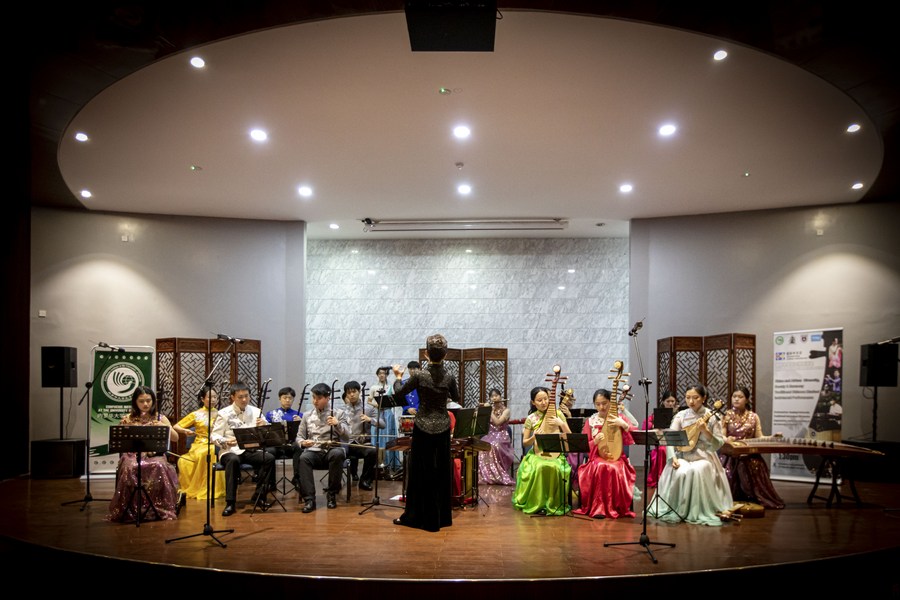
2024 International Chinese Language Day coincides with “Guyu”
The date of April 20 coincides with the traditional Chinese solar term “Guyu,” which translates to “Rain of Millet.” This selection pays homage to Cangjie, a legendary figure credited with inventing Chinese characters, the UN said.
The concert brought together an audience of hundreds, uniting them through the rich tapestry of Chinese music and its universal appeal. The shared appreciation for the music fostered a sense of harmony and cultural exchange.
“Through this performance, we will be immersed in the beauty of traditional Chinese music, further enhancing the position of the Chinese language and culture,”said Professor Stephen Kiama, Vice Chancellor of the University of Nairobi.
The concert program included a variety of pieces. The first performance was the Ensemble “Celebration,” conducted by Professor Zhang Jingbo. This piece was adapted from Yangtze River Delta folk music, reflecting the joyous spirit of local people celebrating festivals.
Another well-known piece, the Chinese folk song “Jasmine Flower,” was performed, conveying themes of beautiful emotions and wishes.
The Kenyan student who sang “Jasmine”, Zhang Meiling, said that this song is a traditional song of Jiangsu and she felt very honored to be able to perform with a band from Jiangsu. She said, “through this cooperation, I deeply feel the beauty of Chinese traditional music, the profound cultural heritage of China, and the profound friendship between the people of China and Kenya.”
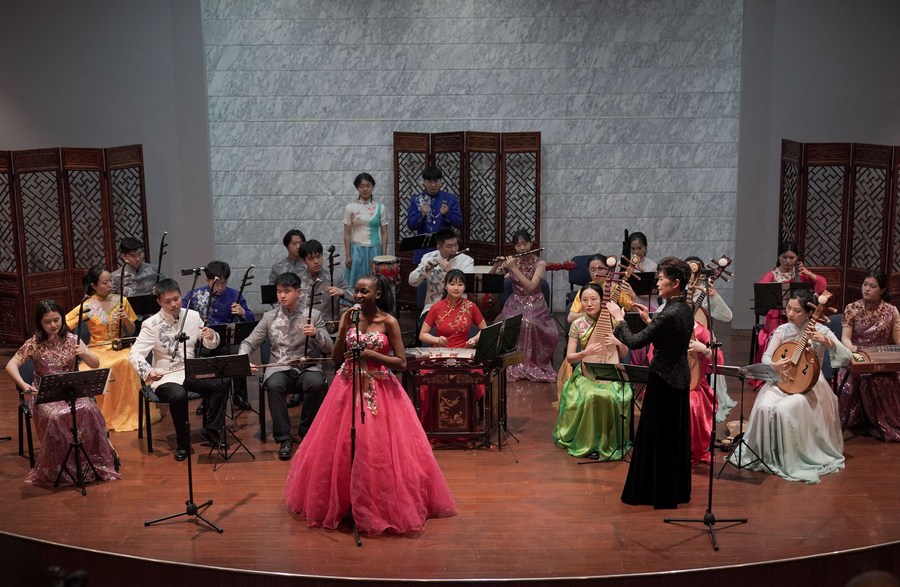
Performances featured both Chinese and Kenyan songs
The audience was also treated to the “Ensemble of Zhongruan Players: Camel Caravan Bells.” It painted a sonic picture of a scene on the ancient Silk Road, where a camel caravan journeyed from afar, their bells ringing continuously as people danced and sang happily around a campfire.
Other pieces performed throughout the evening included “Spring Visit to Xiangjiang River,” “Blooming Flowers and Full Moon”.
A unique piece titled “Charming Africa” was a Chinese Dulcimer solo inspired by the beautiful natural scenery the composer encountered during a visit to the continent. The music incorporated rhythms and musical vocabulary from African folk music, portraying the beauty of African customs and the vibrant energy of its people.
The concert also featured a performance of the world-renowned Kenyan folk song “Jambo Bwana” sung in both Swahili and Chinese by students from the Confucius Institute at the University of Nairobi, accompanied by traditional Chinese musical instruments.
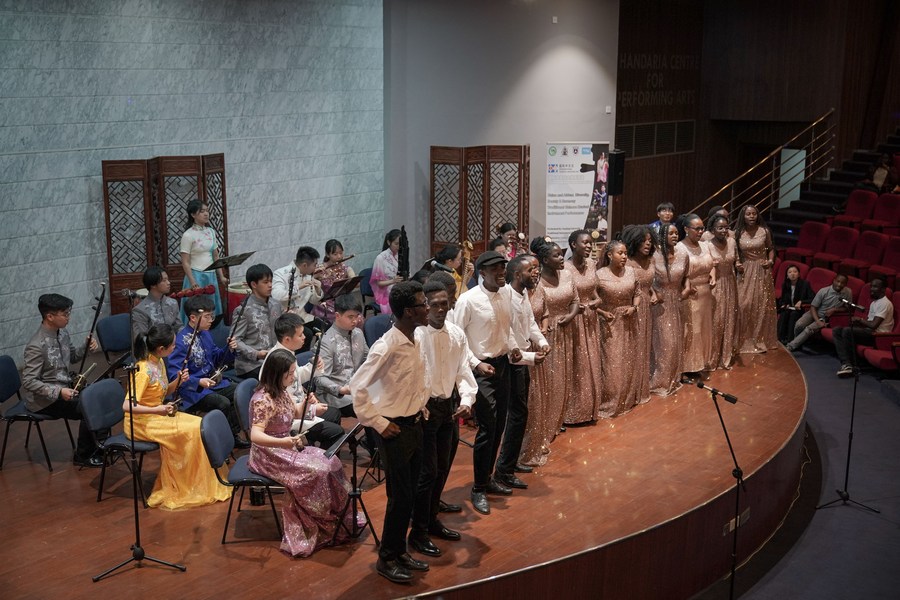
“The Chinese language and culture are intertwined. If you want to enjoy the Chinese language, you must enjoy the culture; you must enjoy the Chinese food you know, they go together. So, you must immerse yourself in the Chinese culture to appreciate the language,” the University of Nairobi Director of Corporate Affairs John Orindi said.
The final piece of the evening was “Fengyang Flower Drum”, a lively and humorous work adapted from the folk music of Anhui Province in China.
The Confucius Institute at the University of Nairobi has a history of hosting celebrations for International Chinese Language Day. Past events have featured cultural performances, interactive workshops on calligraphy and traditional arts, and lectures by guest speakers from China. Language learners often get the chance to showcase their fluency through competitions or presentations.
Speaking about the Nanjing University Orchestra, the University of Nairobi Confucius Institute Director, Professor Wang Shangxue said the students performed the traditional songs so the Kenyan people and the Chinese people can appreciate the Chinese culture.
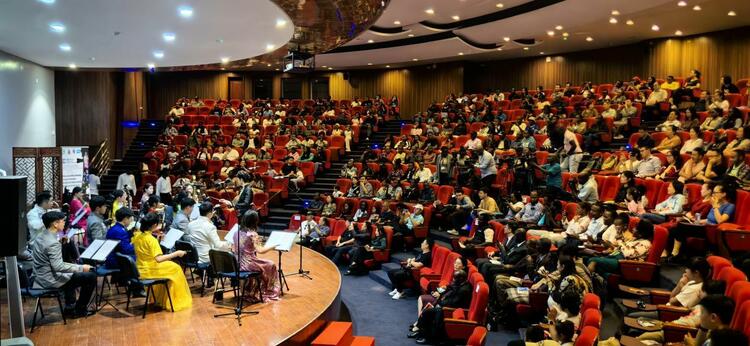
This year’s event provided an immersive experience that deepened the appreciation of Chinese culture and language among the University community. The Confucius Institute plays a vital role in promoting Chinese language learning and cultural exchange in Kenya. This special event was a perfect opportunity for students, faculty, and the wider Nairobi community to celebrate the richness and global influence of the Chinese language.
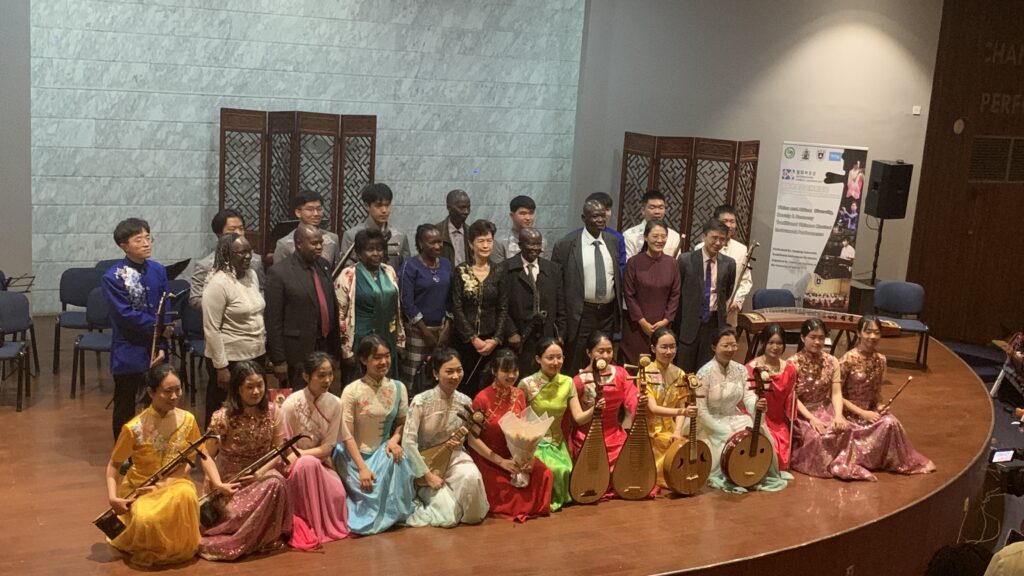
The Chinese language is one of the six official languages used by the United Nations, alongside English, French, Russian, Arabic, and Spanish. The UN’s celebration of Chinese Language Day honors this rich linguistic heritage and promotes multilingualism and understanding between cultures.






